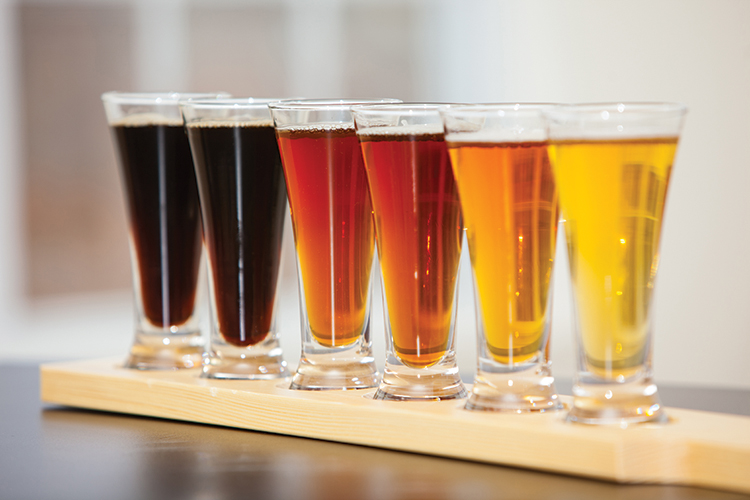 Story by Brendan Skwire | Illustration by Melissa McFeeters
Story by Brendan Skwire | Illustration by Melissa McFeeters
Until Prohibition, Philadelphia was known far and wide as one of the biggest beer-producing cities in America. After repeal… well, you probably know the rest. Smaller, independent breweries folded by the dozen, while mega-breweries like Anheuser-Busch and Miller flourished, delivering quantity over quality.
It wasn’t until the craft brewing renaissance of the 1980s that a little thing called “flavor” started creeping back into the equation. Today Philadelphia and its surrounding area is home to a resurgent brewing industry, from brewpubs like Nodding Head, Iron Hill, Triumph and Dock Street to production breweries like Yards, Philadelphia Brewing Co. (PBC), Victory and many, many more.
A major factor in that rebirth is our water, which has a mineral content that makes it equally good for ales and lagers. But that water supply is imperiled by the natural gas industry, and the extraction process called fracking (see Jacob Lambert’s March 2011 cover story “Stepping on the Gas”), which threatens to introduce toxins into state watersheds. This new and burgeoning industry, which the Tom Corbett administration refuses to tax, is largely unregulated.
What is known is that the Delaware River is at greater risk than the Schuylkill for fracking contamination. This is thanks to loopholes and exemptions dating back to the George W. Bush administration’s EPA, although fracking has been exempt from the Safe Drinking Water Act since its passage back in 1974. Then there’s the so-called Halliburton Exemption, which had allowed drilling companies to avoid disclosing exactly what’s in the fluid they use to force natural gas from deep in the earth (under pressure from environmental groups and a move by the EPA to subpoena fracking chemical information, Halliburton finally disclosed its recipe in November 2010). So, I dropped by a couple of breweries to learn what, if anything, is being done to protect one of our most important resources.
“I started getting really interested in water when Yards moved to Fishtown,” says Bill Barton, an early partner in Yards who now owns Philadelphia Brewing Co. (Yards’ partnership ended in 2007). “When [Yards] got started in a warehouse in Manayunk, we were using water from the Schuylkill, which is twice as hard as water from the Delaware. It’s got twice as much sodium, calcium and magnesium—good mineral content that really brings out the flavor in a beer. Unfortunately, it’s also got plenty of iodine-131.” The Philadelphia Water Department is still working to trace the source of this radioactive chemical, which, as was recently reported, exists in higher levels in Philadelphia’s water than anywhere else in the country.
Mineral content—specifically calcium, magnesium and sodium levels—is crucial in determining what any given beer will taste like. For example, sodium adds body and mouth-feel, though too much will make your beer taste briney, like seawater. Calcium helps remove proteins from beer and acts as a yeast nutrient, speeding fermentation. Magnesium also nourishes yeast, while too much can make for a sour, astringent beer. When his brewing operation moved to Fishtown, “I didn’t really have to adjust the water,” Barton says. “However, I did have to adjust the pH and remove a lot of chlorine,” a chemical used in the city’s water purification plants. Like many breweries, PBC slightly acidifies their water so their flagship ales will have the same flavor consistently.
When asked about the impact of fracking, Barton’s not exactly sanguine, but he’s not panicking, either. “I feel much more confident as a brewer here in Philadelphia, where our water department is responsible for more than a million people’s tap water. I don’t know how the brewers in rural areas are going to deal with it.”
Barton’s view is echoed in a February 2011 position paper on fracking published by the Philadelphia Water Department. “At this point in time, we believe that the current regulatory framework, if enforced, is adequate to protect our water supply from immediate threats,” the department states, while admitting, “the impacts of wastewater discharge on drinking water quality—even under the improved regulations under the state’s wastewater treatment requirements—are not known.”
At Victory Brewing, located an hour or so outside of Philadelphia, Bill Covaleski and Ron Barchet chose their Downingtown brewery’s location specifically for its proximity (less than 14 miles) to the headwaters of the Upper East Branch of the Brandywine Creek.
“You can buy top-quality ingredients, but you can’t pick and choose where you get your water unless you choose the location yourself,” says Victory communications manager Karen Noonan. “Downingtown was a luxury due to its proximity to a clean, local source of water.”
Victory is taking steps to protect its water supply through the release of its Headwaters Pale Ale, which also marks the company’s 15th anniversary.
“It’s our first pale ale,” says Noonan. “We named it to pay tribute to the water we brew with. In naming the beer and talking about the water and how important it is, we wanted to tie that into charitable contribution.”
Thus was born the Headwaters Grant, which seeks to protect that invaluable source. “We evaluated several applications,” says Noonan, “and finally settled on the Guardians of the Brandywine,” a nonprofit that works for “the protection and enhancement of the waters and other natural resources of the Upper East Branch of the Brandywine Creek’s Watershed, including all of its tributaries.”
The Guardians have a unique approach. “They’re creating a specific education program for people who live in the area and depend on the creek,” says Noonan. “The basic message [in water advocacy] is ‘clean water is good,’ which everyone can agree on. But very few individuals want to take responsibility for keeping it clean. We want to re-frame the message as not so much ‘our creek’ but ‘your creek and my creek,’ to encourage individual responsibility for the watershed. That’s what inspired us to award them the grant, because the Guardians of the Brandywine bring it down to the individual level.”
Victory hopes that, as the sales and popularity of Headwaters Pale Ale increase, so, too, will the size and reach of the grants awarded each year.
Pennsylvania’s really lucky to have such a strong rebirth of brewing: It brings jobs, revenue and prestige. A recent report by the National Beer Wholesalers Association found that the state’s brewing industry brings Pennsylvania nearly $7 billion in revenue each year, and provides jobs to nearly 60,000. All of this is only possible because we have so many reliable and abundant sources of fresh, potable water. But without some kind of regulation to keep fracking chemicals out of our streams, creeks and rivers, the state’s brewing industry is at risk. The Corbett administration claims to be committed to creating jobs in the state and healing our broken economy: It really makes you wonder why there’s so much resistance to protecting the ingredient that matters most to the state’s booming brewing industry



